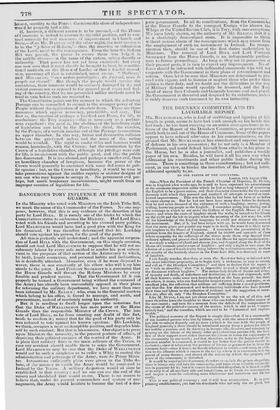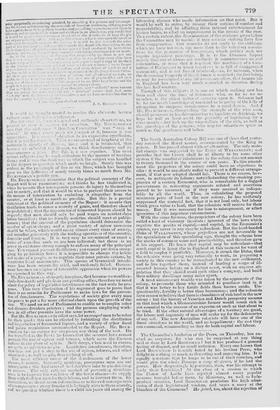TIIE DRUNKEN COMMITTEE AND ITS LAUGHABLE REPORT.
MR. BUCKINGHAM, who is fund of scribbling and figuring at fitli length in print, seems to have had work enough on his hands this last week : he has been carrying on an active correspondence in de- fence of the Report of the Drunken Committee, so provocative of mirth both in and out of the House of Commons. Some of the papers appear to have refused admission to his communications, on the ground that Mr. BUCKINGHAM has abundant and superior means of defence in his own possession ; for he not only is a Member of Parliament, and could defend himself from attacks in his place in the House, but he is also a journalist, and publishes a weekly paper of his own. Besides, he will have it all his own way when addressing his constituents and other public bodies during the recess. There is something in these considerations ; but not suffi- cient, in our view, to hinder the insertion of the following letter, addressed specially to.us.
TO THE EDITOR OF THE SPECTATOR.
London, 14th August 1834. Sift—When the President of the French Chamber of Deputies, M. Dews was in Englend a few weeks ago, he is said to have expressed his astonishment at the erroneous impression under which he had so long laboured of conceiving the English to be a grave nation, and their character remarkable for the earnest decorum with which they pursued and received all attempts at moral or intel- lectual improvement. This was the idea be had been led to form of us before he came among us. But he had not been here many days before he declared, that he had never dreamed of the existence of such a laughing, merry, jesting, trilling, bantering people as the English. I remember seeing him during one of the evenings in which he sat under the Gallery of the English House of CAD* mons ; and when the roars of laughter shook the walls, he turned to his friends on the right and the left to inquire what the meaning of the jest was; for, with all his knowledge of the English language, he could not discover the cause of the merriment. But, if In had been longer with us, he would have discovered that the more grave and painful any topic is in itself, the more it is likely toex- cite laughter in the House of Commons. I remember the presentation of the petition from the females of England, signed by 50,000 and upwards of those whose sympathy for the sufferings of the slaves mule them step beyond their ordinary sphere, and present their petition to the House for negro emancipation: it was made a subject of ribald and obscene jest, and dragged along the floor of the House of Commons amidst roars of laughter : and only a night or two since the relation of a case of female frailty beiog followed by restitution to society, to show the cruelty of the bastardy clauses in the Poor-Law Bill, was drowned M roars of laughter. I can hardly wonder, therefore, at even the Spectator being so infected with this most infectious propensity, as to begin with a nickname, so easy to invent, and call us "the Drunken Committee ;" and then to declare that its report is so " rich in absurdity," that "it is impossible to read a single paragraph of the document without laughter." The melancholy details of disease and crime, of insanity and death, of nakedness and destitution, of fire and shipwreck, with all their horrors, make sonic men heavy-hearted at the bare perusal: but there are others, it seems, who can find food for laughter even in this; and enjoy, as an excellent joke, the reflection that millions are suffering from a moral pestilence, and that the few disinterested and well-meaning individuals who have devoted their time and labour to the collection of evidence and the suggestion of reme- dies are, after all, only "the Drunken Committee." Like M. Dress, I am not yet clever enough to see the wit of all this, and must therefore leave the laughter to those who can fathom the hidden source of the merlintent ; and turn for a moment from the defects of the composition to the errors of the political economy of the matter, which is seid to be " super- latively bad," and the remedies, which are said to be "fantastical and imprac- ticable."
The political economy of the Report is simply this—that if in a community of one hundred persons who live by labour, and, with the utmost exertions, are just able to subsist decently and no inure (which is the case with the people of England generally), there should be introduced aiming them a poison for winch ten imbibe a passion, and, by drinking it, become idle, dissolute, and criminal, by preying on the labour of the ninety sober and industrious persons left, the bar-. den of their support must either increase the labour or lessen the enjoyments at the community by one-tenth ; and that, therdwe, as far as the happiness of the greatest number is concerned, it would be far better that the poison should be excluded—since it takes away the produce of labour, as payment for it, from the common fund—since it leaves no benefit whatever in return—and since, in nib- thin to the idleness which it causes in the tel by whom it is consumed, it is the parent of many diseases, and almost all the crimes by which the property and peace of the community is disturbed.
It would be sound political economy therefore to exclude the peison altogether,
since it brings only evil into the community, and takes away valuable commodi- ties in payment for it ; but if it caunot be excluded altogether, it is then desirable so to strip it of all auxiliary aids and temptations, as to lessen its consumption, and inspire a taste for something more wholesome and nutritious and far less costly. This is our political economy; and it will bear examination. IS in your printing establishment, you had ten drunkards who not only did no good, but were perpetually oceasim....ing mischief, by ass. whit g t!te persons and interrupt • the lattourawl rlestrin mg the materials of t he other workmen, obliging you tu live a puhce focee to bp them in order, and yet calling so you to suspect Mem in idleness, or:,.!c j T \VIVO, 1 iii ci1:411.co in an abash:nee, you wool I find
; ti ! the inueliolds or keep the girl it wslei ;•,• , ieecc, what is ri ne upon the slit all:st , it tet tell be jtA r.wards the sober tends the drunk.trds themselves, to ex- iii e(serel tend prialtwed by industrious • :,,,itte: eirinkthrttion heyonti tier reach. propli.::11 by es, time is tier one . e,,I. pelting evety ship from -e, iper t., semi a copy uf its shest .•e r (.1' s.e. s' le toe. om 5 neeme; cesry keeper • ! t ;,:.,1 ,v,ry driver of a eah to pot a n. e•olleO at thu I !del ill.y-Coach Office. 411 offer,si..e e..ough, 1111
ti-v .0/.1y ; , :1:•T at-e al! Irractical±lo; aryl so is f!i• •Iv 14. if tile seeistature and the out scab, part e: (inie inst. ; sobtie!y., oi:d. I
to th, •
lo
Ali ril
d. tilt, tit! t
out) o If I. r•
p, tilde1.1tat). • ■• I . I • ZI 41: tic :It tlniiot bilt . n , t! .:II thor.2.1it, a::■1‘• ridicule" more current
than mu oen,„;, .; I it io.c'' arenSie" clities shall more " eels rile awl v.,: have no fears but that in
I ii, our eholient servant,
J. Duct: is;:n



















 Previous page
Previous page